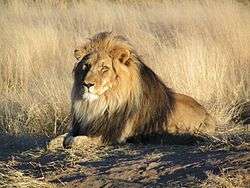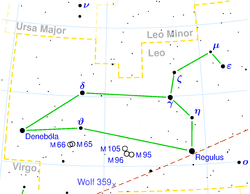Definify.com
Webster 1913 Edition
Lion
Li′on
(lī′ŭn)
, Noun.
1.
(Zool.)
A large carnivorous feline mammal (
Panthera leo
, formerly Felis leo
), found in Southern Asia and in most parts of Africa, distinct varieties occurring in the different countries. The adult male, in most varieties, has a thick mane of long shaggy hair that adds to his apparent size, which is less than that of the largest tigers. The length, however, is sometimes eleven feet to the base of the tail. The color is a tawny yellow or yellowish brown; the mane is darker, and the terminal tuft of the tail is black. In one variety, called the maneless lion
, the male has only a slight mane. 2.
(Astron.)
A sign and a constellation; Leo.
3.
An object of interest and curiosity, especially a person who is so regarded;
as, he was quite a
. lion
in London at that timeSuch society was far more enjoyable than that of Edinburgh, for here he was not a
lion
, but a man. Prof. Wilson.
Webster 1828 Edition
Lion
LI'ON
,Noun.
1.
A quadruped of the genus Felis, very strong, fierce and rapacious. The largest lions are eight or nine feet in length. The male has a thick head, beset with long bushy hair of a yellowish color. The lion is a native of Africa and the warm climates of Asia. His aspect is noble, his gait stately, and his roar tremendous.2.
A sign in the zodiac.Definition 2026
Lion
lion
lion
English

A lion.
Alternative forms
- lyon (obsolete)
Noun
lion (plural lions or lion, feminine lioness)
- A big cat, Panthera leo, native to Africa, India and formerly to much of Europe. The term may apply to the species as a whole, to individuals, or to male individuals. It also applies to related species like mountain lions.
- Tigers and lions share a common ancestor from a few million years ago.
- A male lion.
- (heraldry) A stylized representation of a large cat, used on a coat of arms.
- A Chinese foo dog.
- An individual who shows strength and courage, attributes associated with the lion.
- 2003, Peter Armstrong and Angus McBride, Stirling Bridge & Falkirk 1297–98: William Wallace's Rebellion:
- It was said of [Edward Plantaganet] that 'he was a lion for pride and ferocity but a pard for inconstancy and changeableness, not keeping his word or promise but excusing himself with fair words'.
- 2003, Peter Armstrong and Angus McBride, Stirling Bridge & Falkirk 1297–98: William Wallace's Rebellion:
- A famous person regarded with interest and curiosity.
- Prof. Wilson
- Such society was far more enjoyable than that of Edinburgh, for here he was not a lion, but a man.
- 1919, W. Somerset Maugham, The Moon and Sixpence, ch. 4
- Rose Waterford was a cynic. She looked upon life as an opportunity for writing novels and the public as her raw material. Now and then she invited members of it to her house if they showed an appreciation of her talent and entertained with proper lavishness. She held their weakness for lions in good-humoured contempt, but played to them her part of the distinguished woman of letters with decorum.
- Prof. Wilson
- A light brown color that resembles the fur of a lion
-
lion colour:
-
Coordinate terms
Holonyms
- (individual Panthera leo): pride
Derived terms
Terms derived from lion
|
|
|
Related terms
Translations
big cat Panthera leo
|
|
heraldic charge
Chinese foo dog
person with strength and courage
Adjective
lion (comparative more lion, superlative most lion)
- Of the light brown color that resembles the fur of a lion.
See also
-
 lion on Wikipedia.Wikipedia
lion on Wikipedia.Wikipedia
-
 Panthera leo on Wikispecies.Wikispecies
Panthera leo on Wikispecies.Wikispecies
-
 lion on Wikimedia Commons.Wikimedia Commons
lion on Wikimedia Commons.Wikimedia Commons
- Appendix:Animals
- Appendix:English collective nouns
Anagrams
French
Etymology
From Old French, from Latin leō, from Greek λέων (leon)
Pronunciation
- IPA(key): /ljɔ̃/
- Rhymes: -jɔ̃
- Homophone: Lyon
Noun
lion m (plural lions, feminine lionne)
- (zoology) lion
- (specifically) male lion
- (figuratively) lion (brave person)
- Se défendre comme un lion, - to defend oneself with great courage
- (heraldry) lion
- (figuratively, dated) lion (celebrity; famous person)
- (dated) a style of elegant young man that came after the dandy
